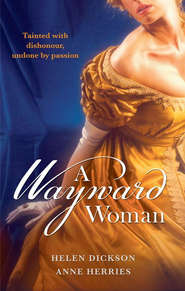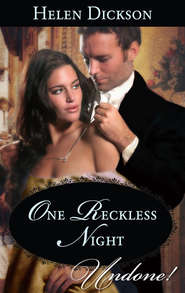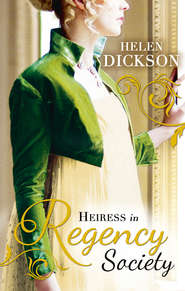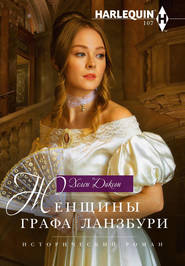По всем вопросам обращайтесь на: info@litportal.ru
(©) 2003-2024.
✖
Lord Lansbury's Christmas Wedding
Настройки чтения
Размер шрифта
Высота строк
Поля
Jane’s heart skipped a beat as his beautiful grey eyes met hers. Pleasure washed over her. ‘I’m sure I will, Lord Lansbury.’ She swallowed hard, unable to think of anything else to say until he had turned his back on her and walked away. ‘Thank you,’ she finally managed to call out, but he must not have heard her words, for he did not turn to look at her again.
‘Oh, dear! My son is hasty sometimes,’ Lady Lansbury said, noting Jane’s dismay. ‘He has grave matters to worry him and he is always so busy. But come, my dear. I’ll take you to Octavia’s rooms.’ She looked at Jane who was somewhat flushed. ‘Are you all right, my dear?’
‘Yes—perfectly.’
A cloud shifted across Jane’s face and her eyelids lowered. The expression in them was unreadable, which was just as well, for she loved Christopher Chalfont from that moment. How else could these feelings that consumed her be explained—she, who had no experience of men in the romantic sense? She told herself that she should doubt her reactions to Lord Lansbury, the first man she had ever been attracted to. She was unable to understand why this should be.
The day she had left France and climbed aboard the boat bound for Dover would live with her for ever, because that was the day she had met him, the day he had entered her mind so that she was unable to think of anything else. Because the differences between them were too vast, she did not fool herself into believing it could ever be any different and that he would ever return her love.
Nothing was normal any more, least of all her feelings about herself.
Chapter Two (#ulink_7e145d06-3477-5888-a590-a4ecf48c9e72)
Jane had been at Chalfont for one whole month and had no reason to regret her decision. The servants were not quite sure about her position. The other young ladies who had cared for Octavia in the past had been employed as governesses. Although Miss Mortimer’s position filled that role, Lady Lansbury treated her as more of a friend. Miss Mortimer was frequently invited to dine with the family, but she always declined, opting to eat in the rooms she shared with Octavia.
Jane realised she had a talent for entertaining Octavia that surprised her. In spite of her lack of experience with children, she managed to win Octavia’s trust and arouse her eager curiosity with the activities they did together. They would walk in the beautiful grounds and at other times Octavia loved to draw and paint, but she was reluctant to learn her letters, so on Lady Lansbury’s advice she did not press her.
But it wasn’t always easy. There were times when Octavia would be silent for long periods and she was unable to concentrate any length of time on any one thing. She was often wilful and sullen and there were tears if she could not get her own way. But on the whole she brought much pleasure to Jane and Lady Lansbury was beginning to lose that tense, anxious look that Jane had noticed on first meeting her.
Hearing the gravel crunch beneath a horse’s hooves on the drive below, she was drawn from her thoughts as she watched Octavia painting pictures in her room. Drawing a deep breath in anticipation of the return of Lord Lansbury from his ride, she moved swiftly to the window and looked down at the man who occupied her thoughts both day and night. He had spent most of the past four weeks in town so she hadn’t seen much of him. The moment she fixed her eyes on his tall, powerfully elegant figure, as he dismounted and handed the reins to a waiting groom, she felt that familiar twist of her heart, that addictive mix of pleasure and discomfort.
* * *
Unaware that he was being observed, Christopher entered the house. At best, he was a fiercely private man, guarded and solitary and accountable to no one. At worst, he was a man with a streak of ruthlessness and an iron control that was almost chilling. He possessed a haughty reserve that was not inviting and set him apart from others in society.
There had been other women. He took them to bed, but he did not let them into his life. He could also be cold, calculating and unemotional, which was his attitude to the decision he was about to make regarding marriage to an American heiress, Lydia Spelling. The American dollars she would bring would go a long way to shoring up Chalfont’s finances. He was still feeling the effects of his father’s ruin, but the returns from his investments were at last beginning to show improvements.
Marriage to Miss Spelling would be advantageous in other ways as well as financial. The Chalfonts had become thin on the ground. To continue the line he had to give some thought to producing an heir. He knew how anxious his mother was for him to marry. If he didn’t produce a legitimate heir, the title was in danger of passing entirely out of the Chalfont family. It troubled him more than anyone realised and he knew he couldn’t go on ignoring the issue.
When his mother had decided to take Octavia on an extensive tour to visit New York and then Paris, reluctant to let them go alone, Christopher had accompanied them. When he’d embarked on the transatlantic voyage, the phenomenon of seeking to marry an American heiress as the solution to his financial situation and to continue the Chalfont line had not entered his head. He hadn’t reckoned on Oswald Spelling.
Spelling, a widower with one daughter, hadn’t passed up the chance to socialise with an earl—British aristocrats had become husbands of choice for American millionaires’ daughters. Invited to dine at the Spellings’s showy mansion on Madison Square, Mr Spelling had seated Lydia on Christopher’s right. It wasn’t subtle, but then it didn’t have to be.
Lydia Spelling was animated and she knew how to assert herself. Encouraged from an early age to express herself and fully confident that she was a worthwhile thing to express, she left Christopher in no doubt that she found him an attractive prospect. As an American heiress she enjoyed a freedom of movement and association that was reserved in Europe solely for married women.
When Christopher finally left New York, he had made no commitment and yet an understanding of sorts had been reached. Lydia was attractive and popular at any event. He did not love her, but making her his wife did not seem such a high price to pay for a lifetime free from financial worry. No sacrifice would be too great if he could restore some of Chalfont’s glories and ensure a more stable future.
* * *
Christopher was ensconced in Chalfont’s library reading the financial sections in the morning papers, one booted foot resting atop his knee,
It was a lovely room. With its beautiful Adams ceiling and Grinling Gibbons chimneypiece, highly polished floor and vividly coloured oriental carpets, it was like an Aladdin’s cave—a treasure trove of precious leather-bound tomes. It smelt strongly of polish and Morocco leather. It was a room which encapsulated every culture and civilisation of the universe, where bookshelves stretched from floor to ceiling, broken only by the fireplace and long windows looking out on to the gardens.
Christopher glanced up when the door opened and his mother swept in.
‘So this is where you are, Christopher. I thought I’d best tell you that I shall be taking charge of Octavia today. I thought it was time Miss Mortimer took some time off to get on with her work. I really wish she had accepted some kind of reward for what she did for Octavia on the ship. I did think of giving her a bank draft—a reward for saving her life—but she will be undoubtedly offended by the money.’
Christopher smiled disdainfully. ‘Perhaps she is not as eager for coin as some of the lower classes would be, who would try to wheedle some sort of monetary reward regardless of the reason.’
‘You’ve become a cynic,’ his mother teased blandly. ‘But Jane is not like that. She is without guile or greed. She is a lovely young woman, don’t you agree?’
Christopher gave her a narrow look over the top of the newspaper. ‘She’s certainly out of the ordinary—having spent her life, by all accounts, like a wandering gypsy. I’ve never seen you so taken with any of the other young ladies we have employed to take care of Octavia in the past.’
‘You’re quite right, and so far I’m thoroughly satisfied. Jane is an absolute treasure.’
‘Unconventional and hopelessly peculiar is how I would describe her,’ Christopher replied drolly, flicking back the next page of his paper. ‘I would have thought that a girl with her background would be devoid of social skills and find it hard to adjust to the kind of world we inhabit.’
‘You are too harsh. Jane is a thoroughly charming and engaging and well-adjusted young woman, with a remarkable intelligence. In the short time I’ve known her I vow she’s lifted my spirits considerably. I know you had reservations about her suitability from the start, but she has proved you wrong. The difference in Octavia is quite startling. You must have seen that for yourself.’
That Christopher had misgivings about Jane was etched into the troubled scowl on his face. His mother would hear no wrong said about the girl who had slipped so neatly and effortlessly into their lives, and for the sake of Octavia and his mother’s happiness he must accept the situation.
* * *
On the other side of the library door, which Lady Lansbury had left ajar, hearing voices and about to enter, Jane paused. Not wishing to intrude, she considered returning to her room, but on hearing Lady Lansbury mention her name, she halted.
Listening to what Lord Lansbury had to say, Jane felt tears of humiliation burn the backs of her eyes. She stepped away from the door, trying to recover her control. If what he said was to be believed, he didn’t want her at Chalfont, which meant his initial cordiality to her had all been a pretence. He was rightly protective of his sister, but that did not lessen the sting of his words or the terrible hurt that engulfed her on hearing them.
Fighting desperately to hold on to her rising anger and shattered pride, she raised her head. After all, it wasn’t her fault if he found her hopelessly peculiar. Lady Lansbury was happy to have her care for Octavia and was pleased with the rapport that had grown between them.
Taking the bull by the horns, she knocked on the door and pushed it open, forcing a smile to her lips when Lady Lansbury crossed towards her and trying not to look at Lord Lansbury, who had dropped his newspaper on to his knee and was looking directly at her, his face expressionless.
‘Come in, Jane. I’m sure you are impatient to begin work. I shall go and see Mrs Collins in the kitchen. I thought we might take Octavia for a carriage ride later if you can spare the time, Christopher.’
‘I will try, but I have a lot of work to do today. I have to go over the books with Johnson and I want to inspect one of the farms myself. Johnson claims they don’t really need a roof, but it’s going to be a rainy autumn and I want to make sure.’
‘Johnson is a very efficient and able bailiff, Christopher. I’m sure he can manage without you, but—if you must.’
‘I will try. I don’t want to disappoint Octavia. I’ll have more time this afternoon.’
‘This afternoon will be fine,’ she said, turning away. ‘I won’t be gone more than a moment. I’ll leave you to set out your work, Jane. Christopher will look after you until I return...’
Her voice faded away into the far reaches of the house and a door was heard to open and close somewhere. Then there was silence.
Without looking at the man lounging in the chair, but conscious of his presence, carrying her things, Jane crossed to a table tucked away in a corner by the window. It would be the perfect place for her to work. Lady Lansbury had introduced her to the library on her arrival at Chalfont, explaining that she would be able to concentrate on her work without interruption.
Christopher watched her pull out a chair and place her files on the surface of the table. With rigid back and head held high, she lowered herself into it. With a mixture of languor and self-assurance, absently drumming his fingers on the leather arm, Christopher let his gaze sweep over her in a contemplative way.
‘How do you find Octavia, Miss Mortimer?’
Her face was half-turned away from him. All he could see was the curve of her cheekbone and the long silky flutter of her black lashes. Her hair was drawn unflatteringly into its severe bun. Her face was composed and her eyes clear and untroubled. In fact, she looked as she always looked, unapproachable and detached from those about her. Yet she was paler than usual and he wondered if she was unwell. She was certainly quiet—in fact, she was as prim as a spinster at a church tea party.
She looked up from sorting out her work as though against her better judgement, and Christopher was mystified by her cool reserve. Her face was set in a mould of chill politeness and he could see it was all she could do to answer him. What the devil had he done to earn her animosity, he wondered, and in such a short time? Then he almost laughed. It was all so ridiculous. He was tempted to ask her outright what offence he had committed, then thought better of it. However, he learned the cause of her cold attitude when she next spoke, and he was contrite. His comments had been unflattering and hurtful.
‘Lady Octavia is a charming girl,’ Jane said crisply. ‘Where she is concerned I take my responsibilities seriously. You may not approve of me, Lord Lansbury, but be assured that I am not out to hurt her in any way.’
‘Ah. So, you overheard what I was saying to my mother, in which case I can see some form of apology is in order. However, since you mention it I did not say that I do not approve of you. On the contrary. I have nothing but respect for you and the work you do. However,’ he said, putting down his newspaper and getting to his feet, ‘what my opinions are concerning you has no bearing on the case. My paramount concern is Octavia’s happiness and well-being. As you will know, having spent some considerable time in her company, she is not like other twelve-year-old girls.’
‘That I do know. Lady Lansbury explained Lady Octavia’s situation before I accepted the post.’












